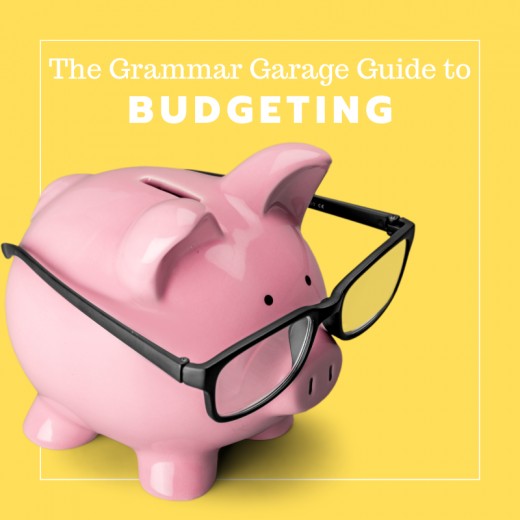How to Manage Your Money When You're in College

Welcome to Student Life!
For many of you, this is the first time you are living away from home. It’s time to enjoy the freedom and all that independent living has to offer! Unfortunately, it also means that you are solely responsible for every aspect of your day-to-day life now, from getting up in the morning to doing your laundry and organizing meals. Most of all, it means you are responsible for your own finances, and that can be extremely tough (been there…)
Now that you are out there, you don’t want to run back to your parents for help and hand-outs. On the other hand, you don’t want to miss out on what the social side of student life has to offer, either. So, it is time to create a budget (and stick to it).
Create a budget and stick to it.
Income
Make a list of all your income items. This could be money from a student or maintenance grant, regular payments from your parents throughout the year, wages from a part-time job, or a loan. How much money are you going to receive each month?
Outgoings
Now make a list of your expenses. This will be a MUCH longer list than the first one. Start with all the essential costs you’ll have, then add the optional ones. Make sure to include accommodation, transport, books, stationary, clothing, food, electricity bills, mobile phone costs, your Netflix subscription, nights out, daytime coffees and lunches – as well as the not so regular costs of Christmas and birthday presents. Done? Right. Next:
Organize Your Money
How do your two lists balance out? If your expenses exceed your income even at this stage, look at what you can let go straight away. Gym membership, take-outs, clothing costs; try to cut it to a minimum.
Then look at when you are being paid vs when you need to pay out. Most income is paid monthly, while expenses occur weekly or even daily. If you receive a grant, it might be paid in a few big instalments that have to stretch over a couple of months. Make a payment plan for each month so you know what amounts have to be paid at regular dates, and how much money you have left to spend every week.
The aim is not to match the two amounts, but to be able to put a little bit to one side every week. Saving even just a tenner a week gives you a bit of a cushion, in case something goes wrong – think smashed phone screen or stolen laptop – or you decide to spontaneously buy festival tickets.
Spending Diary
It sounds boring and pedantic, but it really does help: for the first few weeks, keep track of everything you spend. Everything. Even a take-away coffee or an extra bus fare you hadn’t budgeted for. Write down everything, and see how it compares to your original list of expenses. Are you spending less than you’d expected on groceries, but more on nights out? How does it affect your overall income-outgoings balance?

Get Cooking
Cooking your own food is way cheaper than getting take-aways or buying ready-made food in supermarkets. If you can, get together with other students and take it in turns to cook. But even if you just cook for yourself, make a bigger amount and freeze it in portions; that doesn’t just save you money, but a lot of time, also. Grammar Garage has a special on food, nutrition and diet during the college year coming up, so keep tuned in for that.
Make a shopping list every Monday and shop for the week – NOT in the handy little shop around the corner, but in a supermarket like Lidl, Aldi or Tesco. (I am all for supporting local retailers and food producers, but you can go back to doing that when you’ve finished your studies and are on six figures annually. For now, stick to Aldi.)
Check what’s on offer when you are in the shop – there usually are promotions on different meats or weekly veggie offers – and plan your meals for the week around those items. Buy own brand labels, and stick to the shopping list you brought along.
Packed Lunches
Buy a lunch box, a coffee flask and a reusable water bottle. Instead of spending at least €7 every day, which will just about get you a sandwich and a coffee, you can cover lunches and coffees for the week for about €10 if you bring your own (that includes a home-made sandwich, a yogurt and an apple).
Books
Before you buy a book, make sure that it’s necessary for you to own it. Can you get it from the library? Online? Is it available for download/pdf? If you do have to buy it, can you get it second hand? Somebody else might be very glad to pass it on for a much lower price.

Cigarettes and Alcohol
When you’re going out, only bring the money you are happy to spend for the night. Leave your card at home. As an extra precaution, tell your friends not to loan you money later on, even if you ask them to. It doesn’t matter how sensible you usually are with money, once you’ve had a few pints it might just seem like a great idea to spend next week’s budget on a round of green shots.
And when it comes to cigarettes: Just don’t. Yes, easy to say for me, but you know it’s not good for you, and look at it like this: Smoking 10 a day costs you €44.45 a week, €190.50 a month, and €2,317.75 a year. But on average, smokers have about 20 cigarettes a day, so you can double that - €88.90 a week, and so on. Give up smoking, it’s going to cripple you financially (and kill you, but this article is all about money).
Income, the Second
To maximize your income, consider taking on a part-time job, if you haven’t got one already. We’ll talk about how to get the most out of a job in another post in more detail.








